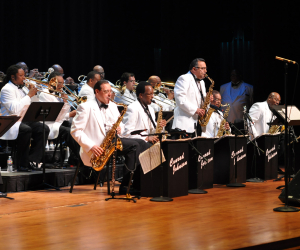ECE associate professor Len Trombetta has been musical since childhood. He started playing the saxophone in 8th grade, and the clarinet four years before that. He was part of a big band group in high school, and in college studying physics at Rensselaer Polytechnic Institute. During graduate work at Lehigh University, he directed a student-run band for a couple of years. In New Jersey he briefly played with a rehearsal band. Then he arrived in Houston.
At a club on Almeda-Genoa (now defunct), he heard about a man named Conrad Johnson, famous in the area.
“One night he showed up,” Trombetta said. “He said, ‘I could use a sax player for my big band,’ and I said, ‘Great, I have some big band experience.'” This was circa 1987, and Trombetta has been a member of the Conrad Johnson Orchestra ever since.
Conrad Johnson was a preeminent musician and educator who directed the Kashmere Stage Band, a high school group that grew to distinction under Johnson’s tutelage in the 1960s and 1970s. The band crisscrossed the nation, attending high school music festivals and conferences, winning 42 out of 46 contests. A documentary titled Thunder Soul recounts the energy of the man and the era that put jazz on the map in Houston.
“Conrad always thought the band could be famous,” said Trombetta. “He wanted to showcase jazz generally using the big band as a vehicle. I have a lot of respect for what Conrad was doing.” The group, now led by James Williams, Jr., strives to carry on Johnson’s vision. A recent performance at the Hobby Center’s Zilkha Hall, featuring famed trumpeter Sean Jones, was very well received, coming together after some tightly focused rehearsals.
Yet the local jazz scene isn’t as prevalent as that of other large metropolitan areas. “You really have to dig it out of the woodwork to find [jazz],” Trombetta mused. Even with the size of the city and the number of music fans, in Houston, jazz is enjoyed like fine wine: quality over quantity.
That’s ok with the members of the Conrad Johnson Orchestra. While some of them are professional musicians, most of the band members have day jobs, like Trombetta. Gigs are rare, but the camaraderie of rehearsals keeps the members involved.
The musically-talented engineering professor may seem paradoxical, but it’s not as unusual as one might think. Trombetta notes he has encountered many engineers and scientists who have musical tendencies, an image that runs counter to the popular notion of the linear, logical thinker.
Whether the practice of music informs the practice of engineering remains to be seen, but Trombetta recognizes a correlation between the artistic process of music and teaching. “I like to think that teaching involves creative effort in the way you approach people,” he said. “The way I approach teaching and the way I interact with students is probably a little different than other folks, maybe because of the music, or the other way around.
“The first time I took lessons in jazz improvisation, my teacher told me, ‘I can’t teach you to play jazz. I can show you a few things and give you some exercises, but you have to figure this out.’ It’s the same with teaching electrical engineering to students.” Trombetta sees his role as a guide, a facilitator. “I care about whether people learn something or not, and I’ll push myself to make sure that people understand what’s going on. Students should be led to learn things by giving them examples. You show them what’s going on, you give them help when they need it or ask for it. I can’t teach anybody to do electrical engineering, but I can teach you some things and show you what to do to figure this out.”
